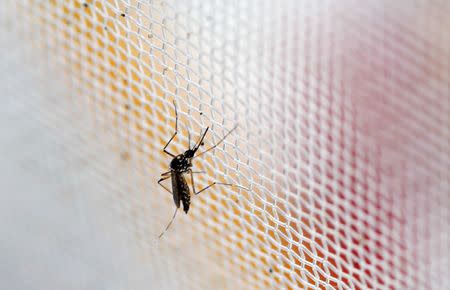U.S. study of 9 pregnant travellers raises new worries about Zika

By Julie Steenhuysen CHICAGO (Reuters) - A study of nine pregnant women from the United States who travelled to countries where the Zika virus was circulating shows a greater-than-expected number of fetal infections and brain abnormalities, U.S. health officials said on Friday. Two of the women had miscarriages, two had abortions, two had apparently healthy children, and one child was born with severe microcephaly, the U.S. Centers for Disease Control and Prevention said. Doctors are still following the two remaining pregnancies, which so far appear to be progressing without complications, the CDC said. "We did not expect to see these brain abnormalities in this small case series of U.S. pregnant travellers," said Dr. Denise Jamieson, a birth defects expert serving on CDC's Zika Virus Response Team. She said it was "greater than we would have expected." Brazil is investigating thousands of cases of babies born with abnormally small heads thought to be linked with Zika, a mosquito-borne virus circulating in Latin America and the Caribbean. In the nine U.S. cases, Zika virus infection during pregnancy was associated with a range of outcomes, including early pregnancy losses, congenital microcephaly, and apparently healthy infants, the CDC said. Microcephaly is a birth defect associated with undersized heads and developmental problems. More information will be available in the future from a new CDC registry for U.S. pregnant women with confirmed Zika virus infection and their infants. An analysis of some cases showed the virus had crossed the placenta and affected the foetuses. In one, a woman travelled to a Zika-affected area when she was five weeks pregnant. Antibody testing confirmed a recent Zika infection. The mother miscarried at eight weeks, and an analysis of the foetus detected Zika virus. "Our lab identified Zika in the placental tissues. That is suggestive that Zika may have caused the miscarriage," CDC Director Dr. Thomas Frieden told reporters on a conference call. But he cautioned that 10 percent to 20 percent of all pregnancies end up in miscarriage, so it was not certain that Zika was to blame. In another case, a woman in her 30s had travelled to a Zika-affected area when she was about 12 weeks pregnant. Shortly after her return, she developed a fever, eye pain, body aches and a rash. Testing confirmed a recent Zika infection. The woman got a routine ultrasound at about 20 weeks gestation, and doctors noted that the foetus was missing its corpus callosum, tissue that connects both halves of the brain. It also had fluid in the brain and there was evidence the brain had shrunk in size. The Zika virus was detected in the amniotic fluid. The woman chose to abort the foetus. In another case, a woman who had lived in Brazil gave birth to an infant with severe microcephaly. The CDC did not release details on where the baby was born. In January, a CDC spokesman confirmed that a U.S. woman who had lived in Brazil gave birth to a microcephalic baby in Hawaii. "It's more evidence to me that this association is continuing to look stronger and stronger," said Dr. Richard Beigi, president of The Infectious Diseases Society for Obstetrics and Gynecology, who had seen the reports. "We want to be cautious because it's a small group of women, but from what I saw, it is suggestive that the effects look to be more severe in the early part of pregnancy," said Beigi, an obstetrician at the University of Pittsburgh Medical Center. The CDC is also investigating another 10 cases of Zika infection in pregnant travellers. On Jan. 15, the CDC issued an advisory telling pregnant women to consider postponing travel to areas with active transmission of Zika virus. On the conference call, the CDC said it has developed a diagnostic test that it plans to distribute to U.S. public health laboratories to speed the diagnosis of Zika, which currently takes about a week. It is not yet clear that Zika virus actually causes microcephaly in babies, but experts say the evidence of a link is growing. Brazil has confirmed more than 580 cases of microcephaly, and considers most of them to be related to Zika infections in the mothers. Brazil is investigating an additional 4,100 suspected cases of microcephaly. The CDC said it has deployed 25 staff to help with the investigation. That was in addition to the 50 CDC staff members in Brazil studying dengue, a related virus. (Reporting by Julie Steenhuysen; Editing by David Gregorio)

